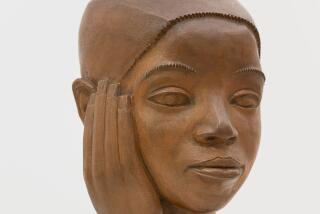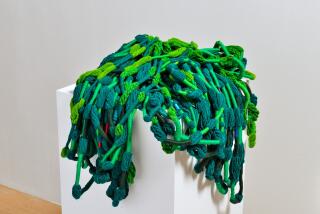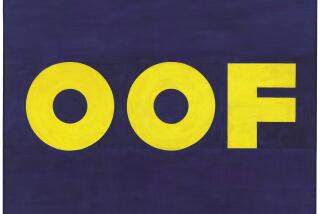Selden Rodman, 93; Poet, Cultural Critic, Collector of Folk Art
- Share via
Selden Rodman, a poet, critic, author, collector and promoter of Haitian and Central and South American folk art, has died at the age of 93.
Rodman, who played tennis two days before his death, died Nov. 2 in a Ridgewood, N.J., hospital of unspecified causes. He lived in Oakland, N.J.
Born to a wealthy Manhattan family and equipped with a trust fund, Rodman pursued an intellectual life of learning, writing, traveling, and collecting and encouraging art. He had given large sections of his vast art collection to his alma mater, Yale University, and to Ramapo College of New Jersey. The remainder of the collection, housed in a gallery at his home, was displayed frequently at art museums across the country.
Rodman wrote or edited more than 40 books of poetry, biography, travel and commentary on culture -- most of the volumes involving the celebrity writers and artists he had a knack for cultivating.
A typical book was his 1994 “Geniuses and Other Eccentrics,” a collection of his own snapshots, thumbnail biographies and notes on how he met each person.
Included in that name-dropping volume were Ezra Pound, Ernest Hemingway, Norman Mailer, Allen Ginsberg, W.H. Auden, Robert Frost, Robert Lowell, Octavio Paz, Antoine de Saint-Exupery, Jackson Pollock, Leon Trotsky, Grandma Moses, David Alfaro Siqueiros, Bertrand Russell and Frank Lloyd Wright.
Rodman’s 1970 travelogue, “South America of the Poets,” toured 12 countries that were illustrated by interviews with their most famous poets, such as Chile’s Pablo Neruda. Praising Rodman’s knowledge of Latin American culture and history, as well as his encounters with the great writers, a Times book reviewer noted:
“He conveys the ambience of great cities and small, of the jungle areas and mountain regions and the plains by means of his encounters with the artists who have sought to identify and explain the condition of the men who inhabit them. Poets, Rodman assures us, are among the best attractions a nation may offer.”
When Rodman published “The Insider” in 1960, his critical study of abstract expressionism and nonrepresentational painting, former Times book critic Robert R. Kirsch said it “very well may be the most important book I have read so far this year ... a book which needed to be written. And Selden Rodman has done a superb job of writing it.”
Rodman began the literary part of his eclectic career in his 1930-31 senior year at Yale, when he co-founded the off-campus satire magazine “The Harkness Hoot.” Later he teamed with Alfred Bingham to co-found and edit the liberal magazine Common Sense.
He first visited Haiti in 1934, bought his first piece of figurative folk art in 1938 for $25, and returned after World War II -- in which he served as a sergeant in the Office of Strategic Services -- to work as co-director of the Centre d’Art of Port-au-Prince.
In the 1930s, Rodman wrote “The Revolutionists,” a play based on the successful 1803 revolt of colonial slaves against France, which made Haiti an independent country.
He was given special leave to go to Haiti for the play’s premiere in 1944, granted by Nelson Rockefeller, who, as head of the State Department Bureau of Inter-American Affairs, thought the production would foster good feelings toward the U.S. The play prompted the then-king of Haiti to make Rodman a commander of the Haitian Legion of Honor and Merit.
Although Rodman became known for collecting folk art from the Southern part of the Western Hemisphere, he also enjoyed assessing culture -- or lack of it -- in the United States.
On a speaking trip to Los Angeles in 1952, he told The Times that the level of culture was declining precipitously in this country and added as illustration:
“Great art is being created right here in Hollywood, but no one knows about it.... For instance, there’s Igor Stravinsky, Arnold Schoenberg, Thomas Mann and painter Rico Lebrun. Not one of them has been used by the motion picture industry.”
Thrice divorced, Rodman is survived by his wife of 40 years, the former Carole Cleaver; three children; and three grandchildren.
More to Read
Sign up for our Book Club newsletter
Get the latest news, events and more from the Los Angeles Times Book Club, and help us get L.A. reading and talking.
You may occasionally receive promotional content from the Los Angeles Times.










